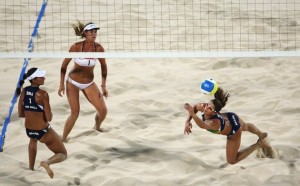This time of year is always a big one for female athletes-- especially with the recent popularity of NCAA basketball superstars like Brittney Griner and Skylar Diggins. While it's so important to celebrate these victories, it's also important to remember the ways in which we still have room to grow when it comes to female athletes. So here are some steps forward, and a few steps back from the past few weeks. Step forward: Mark Cuban announces he would give Brittney Griner a shot to try out for the NBA, and is considering drafting her in the second round. It appears a woman trying out for a NBA team hasn't happened since 1979.
Step forward: Lauren Silberman, a college soccer player, became the first woman ever to participate in an NFL Regional Scouting Combine. She tried out as a kicker (apparently you pay to compete at these events, but there are a limited number of slots).
Step back: Silberman did not perform well-- at all. Neither of her two kicks went beyond 20 yards. Some even suggested this was designed to torpedo women trying out for the NFL in the future.
Step forward: Danielle Coughlin became the first female to win a state wrestling title in Massachusetts. She won in the 106-pound final in Division 2. She also served as a captain of her high school's co-ed team. I really enjoyed this quote from the article about what her victory meant to her: "After I won, a guy in the stands actually turned to me and he said, ‘Smile, I have to send a picture to my daughter in Africa and tell her that in this country women can become anything.’ I actually started crying when he said that."
Step forward: Caroline Pia, whose family had taken their fight to the media to ensure that their twelve-year-old daughter would be able to play on her Catholic League's football team, was given the go-ahead to play in the League.
Step back: Thirteen-year-old Ella Wood in California is the reason why her team-- which won every game in their season-- actually "lost." The Foothill Sports League decided ex post that having a girl play meant a game was forfeited. To their credit, all of Ella's male teammates said they should forfeit. But as of now she won't be able to play with her teammates next year.
But let's end on a more positive note! Former Olympic swimmer Donna de Varona, who helped establish the Women's Sports Foundation and served as its president, is now helping female athletes do even more trailblazing. She recently announced a partnership with Ernst & Young to help female athletes transition to leadership roles in their careers outside of sport.
I found this statistic especially interesting: About 4800 women took part in last year's London Games and less than 30% will return to compete in Rio. While it's somewhat discouraging that this is necessary, overall it will be a huge step forward.
To more steps forward!


